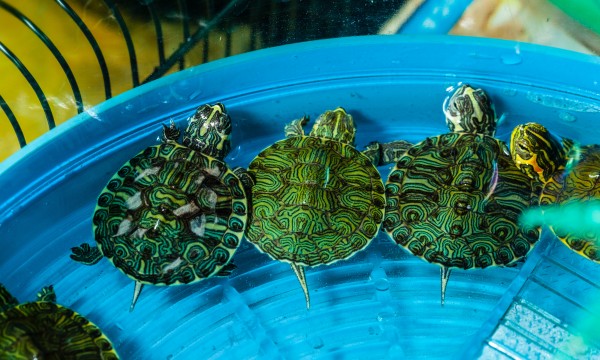
Homemade Organic Food for Reptiles: A Guide to Nourishing Your Scaled Companions
Reptiles, with their diverse needs and captivating presence, have become increasingly popular pets. Ensuring their health and well-being requires a deep understanding of their dietary needs. While commercial reptile food is readily available, many reptile enthusiasts are turning to homemade, organic options to provide their scaly friends with the most natural and nutritious diet possible. This article will guide you through the benefits of homemade organic reptile food, the key ingredients to use, how to prepare balanced meals, and essential safety considerations.
Why Choose Homemade Organic Food for Reptiles?
-
Superior Nutrition: Homemade organic food allows you to control precisely what your reptile consumes. You can select high-quality, nutrient-rich ingredients that cater to the specific dietary requirements of your species.
-
Avoidance of Artificial Additives: Commercial reptile foods often contain artificial colors, preservatives, and fillers that can be detrimental to your reptile’s health. Homemade organic options eliminate these harmful additives.
-
Enhanced Freshness: Freshly prepared food retains more of its natural vitamins and minerals compared to processed commercial diets. This can lead to improved health, vibrant colors, and increased vitality in your reptile.
-
Cost-Effectiveness: Depending on the ingredients you choose, homemade reptile food can be more cost-effective than premium commercial brands, especially if you source ingredients from your garden or local farmers market.
-
Bonding Opportunity: Preparing food for your reptile can be a rewarding experience, strengthening the bond between you and your pet.
Key Ingredients for Homemade Organic Reptile Food
The ideal ingredients for your reptile’s homemade diet will depend on its species, age, and specific nutritional needs. However, some common and beneficial ingredients include:
1. Leafy Greens:
- Kale: Rich in vitamins A, C, and K, as well as calcium and fiber.
- Collard Greens: High in calcium, iron, and antioxidants.
- Mustard Greens: A good source of vitamins A and C, as well as folate and fiber.
- Dandelion Greens: Nutritious and readily available (ensure they are pesticide-free).
- Romaine Lettuce: A safer option than iceberg lettuce, which has minimal nutritional value.
2. Vegetables:
- Squash (Butternut, Acorn, Zucchini): Provide vitamins A and C, as well as fiber.
- Sweet Potato: A good source of beta-carotene (vitamin A precursor) and fiber.
- Carrots: Rich in beta-carotene and fiber.
- Green Beans: Provide vitamins, minerals, and fiber.
- Bell Peppers (Red, Yellow, Orange): High in vitamins A and C, as well as antioxidants.
3. Fruits (in moderation):
- Berries (Strawberries, Blueberries, Raspberries): Rich in antioxidants and vitamins.
- Melons (Watermelon, Cantaloupe): Hydrating and provide vitamins A and C.
- Papaya: Contains enzymes that aid in digestion.
- Mango: A good source of vitamins A and C.
- Figs: High in fiber and calcium.
4. Protein Sources:
- Insects (Crickets, Mealworms, Dubia Roaches): Essential for insectivorous reptiles. Ensure they are gut-loaded with nutritious foods before feeding.
- Earthworms: A good source of protein and nutrients.
- Cooked Lean Meats (Chicken, Turkey): Suitable for some carnivorous reptiles, but should be offered sparingly.
- Hard-Boiled Eggs: A good source of protein and nutrients.
5. Supplements:
- Calcium Powder: Essential for bone health, especially for growing reptiles and egg-laying females.
- Multivitamin Powder: Provides a range of vitamins and minerals to ensure a balanced diet.
Preparing Balanced Homemade Reptile Meals
Creating balanced meals for your reptile involves combining the right proportions of leafy greens, vegetables, fruits, and protein sources, while also considering the need for supplementation. Here’s a general guideline:
-
Herbivorous Reptiles (e.g., Iguanas, Tortoises):
- 70-80% Leafy Greens
- 20-30% Vegetables and Fruits (in moderation)
- Calcium and Multivitamin Supplementation
-
Omnivorous Reptiles (e.g., Bearded Dragons, Box Turtles):
- 50-60% Leafy Greens
- 20-30% Vegetables and Fruits (in moderation)
- 20-30% Protein (Insects, Cooked Lean Meats)
- Calcium and Multivitamin Supplementation
-
Carnivorous Reptiles (e.g., Snakes, Some Lizards):
- Primarily Whole Prey Items (e.g., Mice, Rats)
- Supplementation may be necessary if whole prey is not consistently available.
Steps for Preparing Homemade Reptile Food:
- Gather Ingredients: Select fresh, organic ingredients appropriate for your reptile’s species.
- Wash Thoroughly: Wash all fruits and vegetables to remove any dirt or pesticides.
- Chop or Shred: Cut the ingredients into bite-sized pieces that your reptile can easily consume.
- Mix Ingredients: Combine the ingredients in a bowl, ensuring a balanced ratio of greens, vegetables, fruits, and protein (if applicable).
- Supplement: Sprinkle the appropriate amount of calcium and multivitamin powder over the mixture.
- Serve Immediately: Offer the food to your reptile promptly. Remove any uneaten food after a few hours to prevent spoilage.
Important Safety Considerations
- Research Your Reptile’s Specific Needs: Every reptile species has unique dietary requirements. Thoroughly research your reptile’s needs before making any dietary changes.
- Avoid Toxic Foods: Some foods are toxic to reptiles, including:
- Avocado
- Rhubarb
- Onions
- Garlic
- Chocolate
- Monitor Your Reptile’s Health: Observe your reptile for any signs of digestive upset, weight loss, or other health problems. Adjust the diet as needed.
- Consult with a Veterinarian: If you have any concerns about your reptile’s diet or health, consult with a veterinarian specializing in reptiles.
Conclusion
Homemade organic food can be a fantastic way to provide your reptile with the best possible nutrition. By carefully selecting ingredients, preparing balanced meals, and adhering to safety guidelines, you can help your scaly companion thrive. Remember to always prioritize your reptile’s specific needs and consult with a veterinarian if you have any questions or concerns. Enjoy the process of creating nutritious and delicious meals for your reptile, and relish the enhanced health and vitality that come with a wholesome, organic diet.

